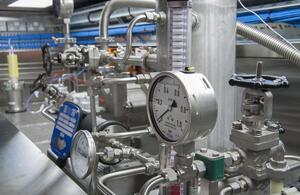UKAEA awards £9.6m to six organisations for fusion projects
The contracts were awarded through the Fusion Industry Programme to scale up projects dedicated to addressing fusion energy challenges.

Equipment at UKAEA’s Tritium Fuel Cycle facility - Image credit: UK Atomic Energy Authority
The United Kingdom Atomic Energy Authority (UKAEA), the UK’s national fusion energy research and development organisation, has awarded six organisations with £9.6 million of contracts to advance their concepts to support fusion energy development.
The contracts were awarded to three universities and three companies focusing on digital engineering and fusion fuel cycle developments dedicated to addressing fusion energy challenges.
The contracts range between £460,000 and £1.9m, and are funded by UKAEA’s Fusion Industry Programme, an initiative launched in 2021 to develop the necessary technology and skills for the future global fusion powerplant market.
The contracts will develop next-generation digital tools for future fusion powerplant designs, and advanced production and handling of hydrogen isotopes.
Tim Bestwick, UKAEA’s Chief Development Officer, said: “There has been significant progress in the development of fusion science, engineering and technology, both in the UK and globally.
“These organisations have been awarded contracts to scale up their projects after successfully developing their technologies to the ‘proof of concept’ stage. The continued support from the Fusion Industry Programme will enable these fusion projects to be scaled up and contribute further to the growth of the global fusion powerplant market.”
The latest contracts build upon the Fusion Industry Programme contracts awarded in December 2023. The Fusion Industry Programme represents a crucial component of UKAEA’s pioneering efforts alongside academia, other research organisations, and the industrial supply chain to commercialise fusion energy technology.
The full list of organisations awarded contracts to scale up their fusion projects under Cycle One, Phase Two, of the Fusion Industry Programme include:
Accelerating fusion powerplant design with next-generation digital tools
| Organisation | Project title | Project summary |
|---|---|---|
| Full Matrix | Development of Digital Tools to Enable Remote Ultrasonic Inspection of Fusion Reactor In- Vessel Components | This project addresses the theme of accelerating fusion power plant design with next-generation digital tools. This project will develop a prototype for a new approach to condition monitoring of pipe using low frequency ultrasonics, with unique high sensitivity electromagnetic acoustic transducers (EMATs) and digital twin technology. |
| University of Manchester | DBO-IM: Design, Build and Operation of Fusion Power Plants in the Industrial Metaverse | The purpose of the project is to implement novel Cyber-Physical Systems technology and elements of enabling infrastructure with the goal of radically compressing the development timelines for fusion machine design and manufacture. |
Reducing fusion powerplant fuel requirements with advanced production and handling technology for hydrogen isotopes
| Organisation | Project title | Project summary |
|---|---|---|
| AqSorption Ltd | A project to efficiently separate hydrogen isotopes via graphene molecular sieves for use cases with the fusion sector. | The project’s overall aim is to demonstrate the differential mechanism within electrolysis cells and across molecular sieve gas membranes that favour light hydrogen exchanges and proportionally retain more heavier isotopes. |
| IS-Instruments Ltd | Gas Raman Detection of Tritium (GRADE) | The project aim is to expand on the work conducted during GRADE phase 1 and continue the development of the Gas Raman technology, and to confirm its ability to successfully analyse for tritium. |
| University of Bristol | Studying Tritium in Diamond Energy Structures (STRIDES) | STRIDES seeks to develop and to demonstrate a highly novel diamond-based tritium detector technology that can be deployed in the fusion fuel delivery system as well as the fusion machine walls to monitor tritium use in real-time and migration. |
| University of Liverpool | Molecular Cage Materials for Hydrogen Isotope Separation | The University of Liverpool is developing advanced materials for hydrogen isotope separation, a key challenge for fusion energy applications. Our hybrid nanoporous materials exploit kinetic quantum sieving (KQS) to separate isotopes with high selectivity and uptake capacity. These properties are essential features of a viable and scalable solution for hydrogen isotope generation. |
To find out further information, please visit https://ccfe.ukaea.uk/programmes/fusion-industry-programme/